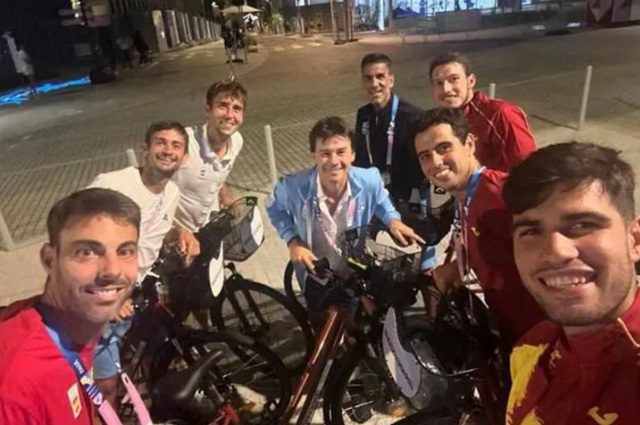BTN News: Since Argentina first participated in the Olympic Games a hundred years ago in Paris 1924, tennis has brought the country many medals, totaling five. Gabriela Sabatini and Juan Martín del Potro won silver in singles in Seoul 1988 and Rio de Janeiro 2016. Del Potro also won a bronze medal in London 2012. In men’s doubles, Javier Frana and Christian Miniussi won bronze in Barcelona 1992, sharing the podium with Croatian players Goran Ivanisevic and Goran Prpic. In Athens 2004, Paola Suárez and Patricia Tarabini added to Argentina’s medal tally with a bronze in women’s doubles.
In Paris 2024, the Argentine tennis team, led by captains Guillermo Coria and Mercedes Paz, entered the maximum number of male players allowed (six) and two female players. The national team competed on the clay courts of Roland Garros. This surface is familiar and favorable for Argentine players. They played in all available categories: men’s and women’s singles and doubles, and mixed doubles. However, Argentina’s chances of winning a medal were ended early in most cases.
Sebastián Báez (ranked 18th) and Francisco Cerúndolo (ranked 26th) won two matches each before losing in the round of 16 to higher-ranked opponents. Báez lost to Greece’s Stefanos Tsitsipas (ranked 11th) and Cerúndolo lost to Norway’s Casper Ruud (ranked 9th). Mariano Navone (ranked 37th) and Tomás Etcheverry (ranked 36th) reached the second round but lost to Italy’s Lorenzo Musetti (ranked 16th) and Russia’s Roman Safiulin (ranked 66th). Expectations were higher for Navone and Etcheverry. Navone had an impressive season with finals in Rio de Janeiro and Bucharest on the ATP Tour, and Etcheverry was a quarterfinalist at the French Open in 2023.
In men’s doubles, Etcheverry teamed up with Navone, who replaced the physically exhausted Cerúndolo. They were defeated in the first round by the Dutch pair Robin Haase and Jean-Julien Rojer. Controversially, Coria and the Argentine Tennis Association, led by Agustín Calleri and Mariano Zabaleta, decided not to call up Horacio Zeballos, the world’s top-ranked doubles player and Argentina’s best in the specialty. Consequently, Argentina’s main doubles pair in Paris 2024 was Andrés Molteni and Máximo González, ranked 12th and 16th in doubles and sixth seeds in the Olympics. Despite their expertise, they lost to the Spanish duo of Rafael Nadal and Carlos Alcaraz in a closely contested match, leaving a bitter taste as they could not capitalize on their doubles experience against the less seasoned pair.
Nadia Podoroska (ranked 86th) qualified for Paris 2024 based on her ranking but had a disappointing debut in her second Olympics. She lost to France’s Diana Parry (ranked 59th). This defeat marked her seventh consecutive loss on the circuit. María Lourdes Carlé (ranked 85th) secured her spot by winning a silver medal at the Pan American Games in Santiago 2023. She had a bright start by defeating Germany’s Tatjana Maria (ranked 68th) with a double 6-0 but fell in the second round to the second seed, the USA’s Coco Gauff, with a double 6-1. Podoroska and Carlé paired up in women’s doubles, advancing to the second round after defeating the German team of Maria and Tamara Korpatsch but were eliminated in the round of 16 by Spain’s Cristina Bucsa and Sara Sorribes Tormo.
Initially, Podoroska and Machi González did not have the ranking to enter the mixed doubles draw, a position that would have been directly available with Zeballos. However, the withdrawal of Kazakhstan’s Elena Rybakina and Alexander Bublik allowed the Argentine pair to compete. Despite the opportunity, they lost to the powerful duo of Coco Gauff and Taylor Fritz in a tightly contested match, which ended with a foot fault on Podoroska’s serve when facing match point.
The Argentine tennis delegation, including Coria and Paz, vice president of the Argentine Tennis Association Florencia Labat, development director and assistant coach Franco Squillari, physiotherapist Mariano Seara, and coordinator Viviana Gentile, enjoyed the Olympic experience and the camaraderie with other athletes. Coria, for instance, took photos with Carlos Alcaraz and Novak Djokovic, as well as other Spaniards, including Marcel Granollers, Zeballos’ regular doubles partner who competed in the Olympics with Pablo Carreño Busta.
Reflecting on the experience, Cerúndolo expressed his appreciation for the Olympic environment and the opportunity to interact with other athletes. He highlighted the unique team spirit that differs from the usual solitary nature of tennis competitions. Despite the optimism shown by Coria and Paz before the trip to Paris, the results did not meet expectations, particularly among the male players. The absence of Zeballos, who could have competed in doubles or partnered with a singles player, remained a point of contention. The next challenge for Argentina’s men’s tennis team is the Davis Cup group stage from September 10-15 in Manchester. This event is crucial and might mark Coria’s last season as captain, a role he took on in 2022.
For the women’s team, the next collective challenge is the Billie Jean King Cup playoffs on November 15-16 in São Paulo, Brazil. Under Paz’s leadership since November 2018, the team aims to secure a spot in the 2025 qualifiers, equivalent to the World Group level.
Tennis, arguably the sport that generates the most excitement in Argentina after football, left the Olympics prematurely and without realistic medal prospects, a stark contrast to previous achievements.


